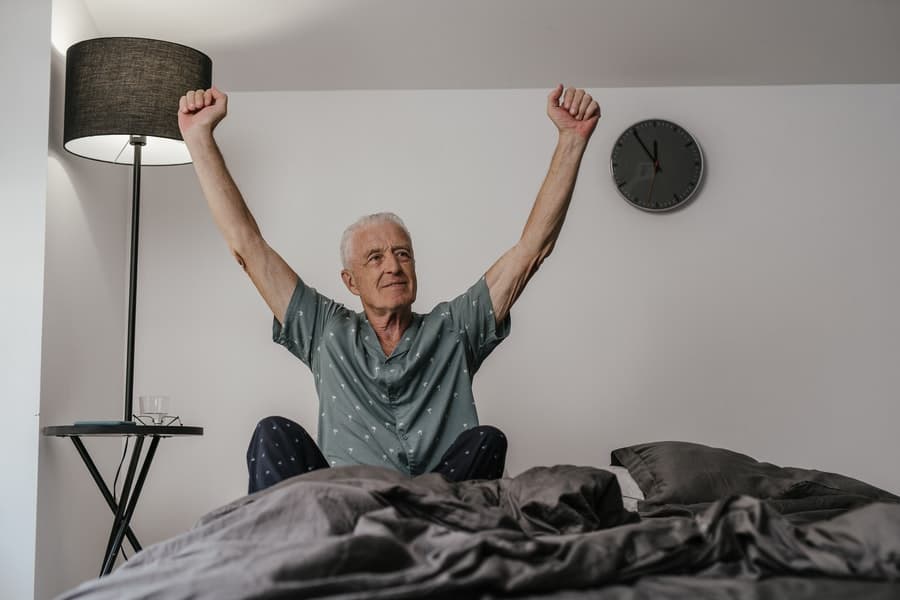There are times when you wake up in the middle of the night and can’t go back to sleep for at least another hour. You lie in bed, staring at the ceiling, and your mind starts to wander. Why do I shake when I wake up? Are there any benefits to waking up in the middle of the night? Do other people experience this or is it just me? Maybe I should get some light, reading a book might help me relax… And then you start shaking again. This article will explain why you shake when you wake up, and what you can do about it.
What Is Sleep Shaking?
Sleep shaking is a common issue affecting millions of people worldwide. Many people experience this at one point or another. This is a condition in which a person involuntarily shakes or vibrates while sleeping. Sleep shaking can occur while you are sleeping in any position. It occurs mostly during the deepest stages of sleep when your brain sends signals to your muscles to cause them to twitch. This is completely normal, and it happens to everyone. You just don’t usually notice it because you’re in a sleeping state and not consciously aware of the vibrations.
Why Do We Shake When We Wake Up?
The Science Behind Shaking When You Wake Up
If you’re not a fan of waking up to that sudden jolt of motion, it may be comforting to know that it’s nothing serious or abnormal. In fact, it’s a very common occurrence that happens to people of all ages and walks of life. This shaking when you wake up is a type of myoclonus, which is a sudden movement or contraction of a group of muscles. A common side-effect of sleep is known as “hypnic jerk” or “sleep start”. It occurs when you fall asleep so fast that your body doesn’t register it as sleeping, which stimulates some involuntary movement like a jolt or shudder. This can happen during naps as well. Sleep starts are most likely to occur during periods of light sleep, like when you’re dozing off or falling asleep. They’re also more common during childhood, which is when they’re most likely to lead to sleep paralysis.
Muscular Twitch
A common cause of the sudden jolt of movement when you wake up is a muscular twitch. These are tiny spasms in your muscles that can cause you to shake briefly. You can usually feel these spasms in the part of your body where the twitch happens, such as your calf, arms, or neck. Muscle twitches can happen throughout the day, but they’re most likely to occur when you’re sitting still for a long time—like when you’re in a long lecture. They can also happen when you’re falling asleep, which is why they’re sometimes called sleep twitches. Although they can be annoying, they are not harmful.
Morning Jump Start
Another common cause of waking up frantically is an increase in adrenaline and blood pressure as your body wakes up. These reactions in your body cause you to wake up suddenly and frantically, causing your muscles to tense up. One example of this is waking up with a start because you’re having a bad dream. It’s not uncommon to wake up from a bad dream with your heart pounding, feeling like you’re still in the dream. Other reasons for waking up suddenly include anxiety, stress, or an inability to switch off your mind before bed. These feelings can make it hard for some people to fall asleep in the first place, which is a condition called insomnia. Insomnia can be caused by stress, anxiety, or other factors like a noisy environment or poor sleep habits.
Dopamine spike
Dopamine is a neurotransmitter that’s associated with being awake and alert. So when you wake up with a start, there’s a spike in your dopamine levels, making you feel much more awake than you should be. This can lead to a feeling of panic and discomfort, which is why many people wake up feeling like they can’t get back to sleep. To help combat this dopamine spike, try to create a calming environment before bed. Limiting screen time and cutting back on caffeine, alcohol, and sugar can help you get a good night’s sleep. You can also try relaxing activities like meditating or doing yoga before bed for a restful sleep.
Confusion-Based Tremors
This type of shaking when you wake up is caused by a chemical imbalance in your body. These chemical imbalances can be caused by a number of things, like a deficiency in certain vitamins or minerals, medication side effects, or even an imbalance in your gut bacteria. If you experience confusion-based tremors, you might wake up with a feeling of being ungrounded or like you’re moving through a fog. You might also have trouble focusing and finding the right words when you try to speak. This can be especially true if you’re low in certain B vitamins, like B6 or B12.
How To Stop Shaking When You Wake Up?
Exercise daily
Regular exercise helps in releasing stress hormones, which can be one of the reasons behind nightmares. So if you exercise daily, they will be released once again, before you go to sleep.
Develop good sleeping habits
The best way to deal with nightmares is to develop good sleeping habits. So don’t watch scary movies before bed. Also, don’t drink caffeine in the evening at all. It will keep you awake and disturb your sleep. Drink warm milk instead, as it will help you to sleep better.
Eat healthy foods
Another way to stop dreaming of nightmares is to eat healthy foods that are rich in proteins. Eating them before going to bed will help in releasing serotonin, which helps you to calm down and relax better.
Learn to breathe properly
If you feel like you are hyperventilating or unable to breathe, it is a sign that you are dreaming. So try to learn how to breathe properly and control your breathing. You can also try some yoga asanas and pranayama.
Talk to a therapist
If you feel that the nightmares are too strong for you, talk to a therapist. Nightmares are like a gift for a psychologist. They are a way for your subconscious to communicate with your conscious.
Don’t drink coffee or caffeine at all
Coffee wreaks havoc on your sleep and your dreams. It might give you energy when you need to be awake, but it disrupts your sleep patterns and keeps you from getting the rest you need. This can lead to nightmares and other sleep disorders.
Expose yourself to the light slowly
Try to expose yourself to the light slowly. Open your curtains and let the light in. If you are too light-sensitive, try wearing a pair of shades. Also, try not to scratch when you have an itch. If you scratch, you will only scratch the wrong spot and it might hurt more than the itch itself.
Use aromatherapy oils
Try to use different aromatherapy oils like sandalwood, lavender, and chamomile. These oils are known to calm you down and make you relaxed. Try to use them before you go to bed.
Tips To Stop Shaking When You Wake Up
As soon as you recognize that you’re shaking, take a few deep breaths. The vibrations should subside quickly once you wake up enough to calm yourself.
- Raise the temperature of your room. You might be too warm while you are sleeping and your body is trying to cool itself down. If it wakes you up with vibrations, try cooling the room a bit. If you’re cold, you might be waking up from REM sleep, the state in which we dream.
- If you don’t have the blankets on, you may be waking up because you’re too cold. Turn on the lights if you wake up and you’re in a dark room. Your brain might be used to sleeping in the dark and interpreting vibrations as a sign that it’s time to wake up. Slowly move your body while you are in bed.
- If you don’t want to wake up your sleeping partner, try some gentle stretches or yoga poses while lying down. Visualize your muscles relaxing. You can even put on some soothing music while you’re at it.
- Music has been shown to help people fall asleep and stay asleep.
Bottom line
Shaking when you wake up can be frustrating, especially if you’re trying to wake up early for work and can’t get your body to calm down. Luckily, there are a few different things you can do to stop shaking and get back to sleeping soundly. Once you identify what’s causing your sleep shaking, you can take the steps necessary to stop the vibrations and get back to sleep.




















Leave a Reply